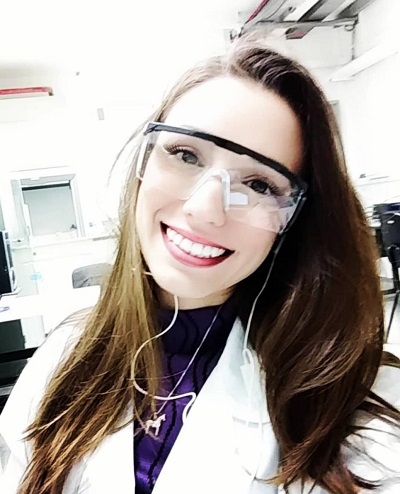Olivia: back at her parents’ house after having developed a sensor for early detection of disease.

Head and neck cancer affects thousands of Brazilians every year. About 60% of these people are diagnosed late, which reduces their quality of life and makes treatment difficult. In her PhD in Materials Science and Engineering, carried out at USP, Olivia Carr generated a low-cost sensor that can detect the propensity of a person developing this cancer.
Olivia’s work was highlighted on the cover of a renowned international scientific journal (Talanta), in addition to generating a patent application, as well as other published articles. And furthermore, the technology developed in this work could be adapted to detect other diseases, including Covid-19.
Olivia, who is 30 years old, wants to continue contributing to society through research, which is the professional activity she most enjoys doing and for which she trained for over a decade. However, since the end of her doctorate, November of last year, she has only seen doors and opportunities closing.
Initially, she received, with great enthusiasm, three proposals to carry out post-doctoral studies in company projects, but two of them did not come through due to the pandemic (the companies decided not to make this investment in light of the new scenario) and the third did not succeed for other reasons. The young PhD then participated in a call from CNPq (the main Brazilian federal research funding agency) for projects related to the fight against Covid-19, in which she would receive a scholarship. However, her project was not approved for funding. After these initial frustrations, Olivia continued to participate in selection processes in research institutions and sent her resume to companies in Brazil that have a research and development area. Unfortunately, this path was not successful.
In parallel, in order to remain active and continue her career, she has worked with old and new collaborators, writing scientific articles and an academic book chapter for publication. All without receiving any payment, which is why she had to return to her parents’ house in the city of Rio Claro, which she had left to do her doctorate in São Carlos.
But it is not the first time that Olivia has experienced financial constraints in order to do research. In the four years of her doctorate, she spent more than half of that time without a scholarship. And here it is noteworthy to clarify that it is wrong to think that a doctoral student receives a scholarship to have more time for study or leisure. The doctorate is, in most cases, a full-time activity, which includes both the student’s theoretical training (the subjects taken) and the practical training (the doctoral research). Moreover, doctoral research is, in addition to training, a complete scientific undertaking, with results that contribute to the advancement of world science and industrial innovation.
Thus far, Olivia has not given up being a researcher, a profession that captivated her at the end of her undergraduate degree in Physics, when she discovered the day-to-day life of a research laboratory. However, after 10 months without pay, this science professional, trained to develop devices that can have great impact on people’s health, has started to evaluate other options, such as teaching Physics.

Paula Campos
Eu desisti da carreira acadêmica após o doutorado e fui para a iniciativa privada. Mesmo com dúvidas, acredito que tenha sido a melhor opção para o momento. Infelizmente a situação do Brasil não tem sido fácil.
Rafael Furlan
Esta é uma triste (de muitas) consequências de um país que abidica de sua soberania ao deixar de investir na ciência, importante motor para o desenvolvimento de uma nação forte. Nosso investimento em ciência vem diminuindo vertinosamente, ano após ano, atingindo números atuais que se equiparam àqueles de 2005 (Fonte: Tesouro Nacional, 2020). Sem falar na indústria – que poderia absorver a Dra. Olívia Carr e seu conhecimento aplicado – que vem sofrendo encolhimento recorde em uma velocidade impressionante. Esse é o reflexo de um país sem projeto de nação (há muito tempo), que (mais do que nunca) flerta com seu passado de colônia, e onde a inteligência brasileira é subaproveitada. Pagamos eu, você, a Olívia, mas sobretudo as próximas gerações.
Ivan H Bechtold
Mais um exemplo de profissional altamente qualificado desenvolvendo ciência aplicada ao bem-estar da sociedade, especialmente para um problema de saúde pública, que não tem seu valor reconhecido pelos governantes. Quem mais perde com isso é o próprio país, pois pesquisa gera inovação, inovação gera riqueza e riqueza gera desenvolvimento social (quando bem administrada). Juntos pela valorização dos pesquisadores e da ciência brasileira!!